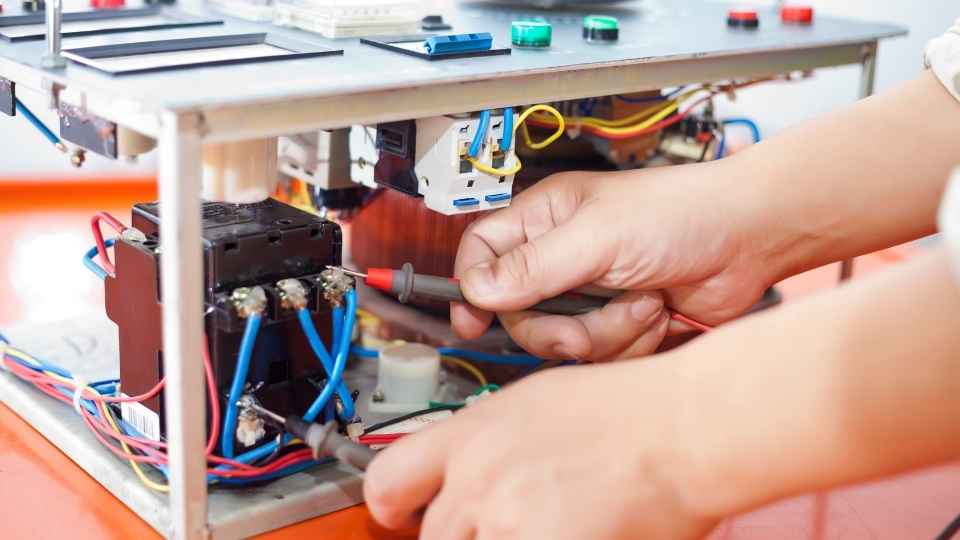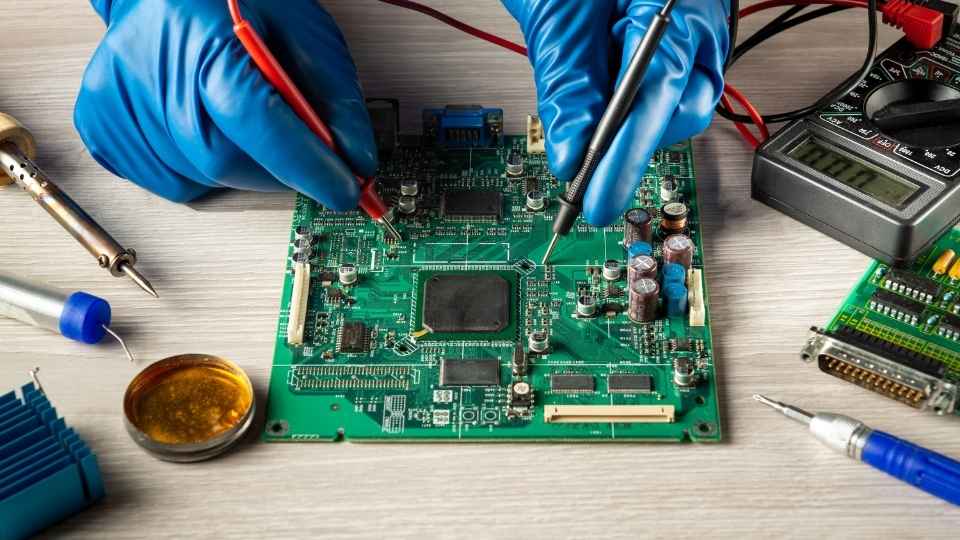
With the increasing demand for efficient energy management, the role of power electronics engineers has become more critical than ever. According to recent statistics, energy consumption worldwide is projected to increase by 48% in the next two decades. This staggering figure underscores the urgent need for innovative solutions that can optimize energy usage and reduce wastage.
In this article, we delve into the world of power electronics engineering and explore how it drives the future of energy management through advancements in technologies such as DC-DC converters, power inverters, motor drives, power management ICs, and energy storage solutions.
Key Takeaways
- Power electronics is essential for optimizing the performance of renewable energy systems, electric vehicles, and smart grids.
- Wide bandgap semiconductors and intelligent power modules are current trends in power electronics, offering higher performance and lower losses.
- Advancements in DC-DC converters revolutionize energy conversion, providing more efficient and compact solutions.
- The integration of advanced wide-bandgap materials in power inverters and motor drives has the potential to enhance energy management capabilities, flexibility, and efficiency in energy usage.
The Role of Power Electronics in Energy Management
Power electronics plays a crucial role in energy management by enabling efficient conversion, control, and distribution of electrical power in various applications. It is the technology that deals with the conversion of electric power from one form to another using electronic devices such as converters, inverters, and rectifiers. These devices are essential for optimizing the performance of renewable energy systems, electric vehicles, and smart grids.
In energy management systems, power electronics helps to improve overall system efficiency by minimizing losses during power conversion processes. It enables seamless integration of renewable energy sources into the grid by efficiently converting DC power generated from solar panels or wind turbines into AC power that can be used for consumption or fed back to the grid. Additionally, power electronics facilitates intelligent control and monitoring of electrical loads and enables active power factor correction.
The advancements in power electronics technology have led to significant improvements in energy management systems, making them more reliable and cost-effective. As we strive for a future with clean and sustainable energy sources, the role of power electronics will continue to be vital in enabling efficient utilization and distribution of electrical power while providing freedom from dependence on fossil fuels.
Current Trends in Power Electronics for Energy Efficiency
The adoption of advanced technologies and innovative designs in the field of energy efficiency has become increasingly prevalent within the realm of power electronics engineering. Power electronics engineers are constantly seeking new ways to improve energy management systems by implementing cutting-edge techniques and concepts.
Some current trends in power electronics for energy efficiency include:

Wide bandgap semiconductors: These materials, such as silicon carbide (SiC) and gallium nitride (GaN), offer higher performance and lower losses compared to traditional silicon-based devices.
Intelligent power modules: These modules integrate various components like sensors, controllers, and switches, enabling better monitoring and control of power flows.
Energy harvesting: This technique involves capturing wasted energy from sources like vibrations or heat and converting it into usable electricity.
Advancements in DC-DC Converters for Enhanced Energy Conversion
Advancements in DC-DC converters have revolutionized energy conversion by providing more efficient and compact solutions for various applications. These converters are essential components in power electronics systems, enabling the conversion of a direct current (DC) input voltage to a different DC output voltage level. The development of new topologies and control techniques has led to significant improvements in efficiency, power density, and reliability.
The use of wide bandgap semiconductors such as gallium nitride (GaN) and silicon carbide (SiC) has further enhanced the performance of these converters by reducing switching losses and enabling higher operating frequencies. Additionally, advancements in digital control techniques have allowed for better monitoring and optimization of system performance.
As a result, DC-DC converters play a crucial role in enabling energy-efficient systems across various industries. Transitioning into the next section on exploring the future of power inverters in energy management, it is clear that continuous innovation in converter technology will drive further improvements in energy efficiency and enable more sustainable energy management solutions.
Exploring the Future of Power Inverters in Energy Management
As technology continues to evolve, the development of innovative power inverter solutions is anticipated to reshape the landscape of energy systems. Power inverters play a crucial role in converting DC power from renewable energy sources into AC power suitable for use in homes and businesses. The future of power inverters holds immense potential for enhancing energy management capabilities, allowing for greater flexibility and efficiency in energy usage.

Advancements in semiconductor technology:
- Integration of advanced wide-bandgap materials like silicon carbide (SiC) and gallium nitride (GaN) enables higher efficiency and power density.
- The development of smart inverters with built-in intelligence enables real-time monitoring and control, optimizing energy flow based on demand patterns.
Grid integration capabilities:
- Bi-directional operation allows power inverters to not only convert DC to AC but also feed excess AC back into the grid, enabling grid stabilization and reducing strain on traditional power plants.
Energy storage integration:
- Power inverters are being designed to seamlessly integrate with energy storage systems, allowing for efficient charging and discharging cycles, thereby maximizing the utilization of stored energy.
The convergence of these advancements will empower individuals and organizations with greater control over their energy consumption while promoting a more sustainable future.
Motor Drives and Their Impact on Energy Consumption
Motor drives have the potential to significantly reduce energy consumption by optimizing the operation of motors in various applications. These devices play a crucial role in energy management, allowing for more efficient and sustainable use of power. By controlling the speed and torque of motors, motor drives ensure that only the required amount of energy is consumed, minimizing wastage and improving overall system efficiency.
In industrial settings, motor drives are widely used to regulate the operation of pumps, fans, and other machinery. By adjusting motor speeds based on real-time demand, these drives can achieve substantial energy savings while maintaining optimal performance. Additionally, motor drives enable advanced control strategies such as variable frequency drive (VFD) technology, which further enhances energy efficiency by reducing power losses during motor start-up and operation.
Moreover, in transportation systems such as electric vehicles (EVs), motor drives are essential components that convert electrical energy from batteries into mechanical motion. Through precise control algorithms and feedback mechanisms, these drives optimize power distribution to provide smooth acceleration while conserving battery capacity.

Overall, motor drives offer a versatile solution for managing energy consumption across different sectors. Their ability to optimize motor performance based on specific requirements leads to significant reductions in power usage without compromising functionality or productivity. As industries and individuals strive for greater freedom in their energy choices, integrating efficient motor drive technologies becomes paramount for achieving sustainable and cost-effective operations.
Power Management ICs: Enabling Efficient Energy Utilization
Power Management ICs (PMICs) play a crucial role in enabling efficient energy utilization. These integrated circuits are designed to efficiently regulate and distribute power within electronic devices, maximizing energy efficiency and minimizing wasted power.
PMICs offer several key benefits:
- Voltage regulation: PMICs ensure that the voltage supplied to different components of an electronic device remains stable and within specified limits.
- Power conversion: PMICs can convert power between different voltage levels, allowing for efficient energy transfer between various subsystems.
- Energy harvesting: Some PMICs can capture and utilize energy from renewable sources like solar or kinetic energy, further enhancing overall energy efficiency.
Energy Storage Solutions: Innovations and Challenges for Power Electronics
Energy storage solutions play a crucial role in the efficient utilization and management of energy. With advancements in battery technology, there has been a significant increase in the integration of energy storage with renewable energy sources.
Additionally, grid-scale storage solutions are being developed to address the challenges associated with intermittent power generation and demand fluctuations.
Battery Technology Advancements
With the continuous advancements in battery technology, engineers are now able to explore new possibilities for efficient energy management. This progress has led to several notable developments:
Increased energy density: Battery technology has made significant strides in increasing energy density, allowing for longer-lasting and more powerful batteries. This enables devices and systems to operate for extended periods without recharging.

Faster charging capabilities: The advent of fast-charging technologies has revolutionized the way we recharge our devices. With rapid charging capabilities, batteries can be replenished in a fraction of the time it used to take.
Enhanced safety features: Safety is a paramount concern when it comes to battery technology. Recent advancements have focused on improving safety measures such as thermal management systems and reliable protection circuits.
These innovations in battery technology pave the way for more efficient and sustainable energy management solutions, providing users with the freedom to power their devices and systems reliably and conveniently.
Integration With Renewable Energy
The integration of renewable sources into existing infrastructure requires careful consideration and planning to ensure compatibility and optimal utilization. Power electronics engineers play a crucial role in this process by developing advanced technologies that facilitate the seamless integration of renewable energy systems with the grid.
These engineers design and implement power conversion systems that efficiently convert electricity from sources such as solar panels or wind turbines, enabling its safe transmission and distribution. They also develop control algorithms that help regulate the flow of power between different sources, ensuring stability and reliability in the grid.
Furthermore, power electronics engineers are responsible for devising innovative solutions to manage fluctuations in renewable energy generation, such as implementing energy storage systems or smart grids that can intelligently balance supply and demand.
Their expertise is essential for maximizing the potential of renewable energy sources while maintaining the freedom and reliability of our electrical infrastructure.

Grid-Scale Storage Solutions
Grid-scale storage solutions are key to addressing the challenge of integrating intermittent renewable energy sources into the existing power grid. These storage systems play a crucial role in stabilizing and balancing the electricity supply, ensuring that renewable energy can be effectively harnessed and utilized.
Here are three key factors that highlight the importance of grid-scale storage solutions:
Reliability: Grid-scale storage solutions provide a reliable and consistent source of power by storing excess energy during periods of high generation and releasing it during times of low generation or increased demand.
Flexibility: These storage systems offer flexibility in managing variations in renewable energy production, allowing for better integration with the grid and reducing reliance on traditional fossil fuel-based power sources.
Scalability: Grid-scale storage solutions have the capacity to store large amounts of energy for extended periods, making them suitable for supporting increasing levels of renewable energy generation.
Frequently Asked Questions
Are There Any Specific Industry Applications for Power Electronics in Energy Management?
Specific industry applications for power electronics in energy management include renewable energy systems, electric vehicles, smart grid technology, and industrial automation. These applications utilize power electronic devices to efficiently control and convert electrical energy for optimal energy management.
How Do Power Electronics Contribute to Improving Energy Efficiency in Various Sectors?
Power electronics play a crucial role in improving energy efficiency across various sectors. By converting and controlling electrical power, they enable the optimization of energy consumption, resulting in reduced waste and greater sustainability in industries such as transportation, renewable energy, and manufacturing.

What Are Some Recent Developments in DC-DC Converters That Have Enhanced Energy Conversion?
Recent developments in DC-DC converters have revolutionized energy conversion, paving the way for enhanced efficiency and sustainability. These advancements include high-frequency operation, wide input voltage range, and advanced control algorithms, driving the future of energy management to new heights.
What Can We Expect in Terms of Future Advancements in Power Inverters for Energy Management?
Future advancements in power inverters for energy management are expected to focus on increased efficiency, improved reliability, and enhanced integration with renewable energy sources. These improvements will drive the development of more sustainable and efficient energy management systems.
How Do Motor Drives Impact Energy Consumption and What Are the Potential Benefits of Their Utilization?
Motor drives have a significant impact on energy consumption, offering potential benefits such as improved efficiency and reduced environmental impact. Their utilization in energy management can lead to enhanced control and optimization, contributing to a more sustainable future.
 Basic Electronics ConceptsEssential ToolsCircuit Design BasicsMicrocontrollersDIY Electronics ProjectsRoboticsPrivacy PolicyTerms And Conditions
Basic Electronics ConceptsEssential ToolsCircuit Design BasicsMicrocontrollersDIY Electronics ProjectsRoboticsPrivacy PolicyTerms And Conditions
